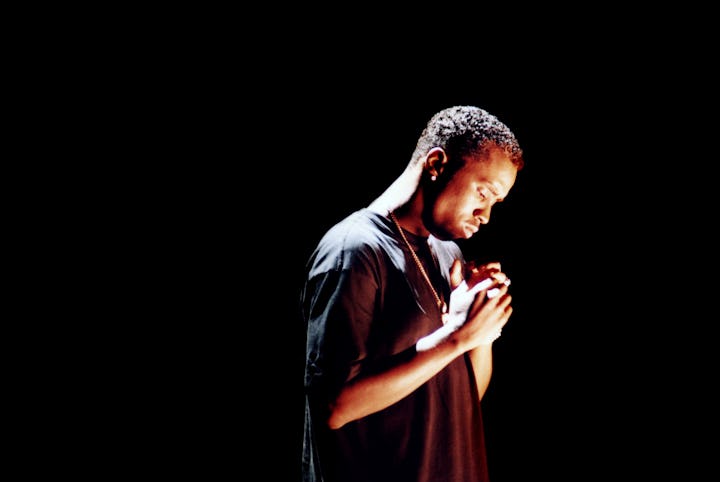26 Years Ago, One Album Turned A Major Hip-Hop Player Into A Legend
Where were you when Puff Daddy blew up?

It’s hard to remember, but at one point, Puff Daddy wasn’t Puff Daddy. While few people were as influential to the 1990s hip-hop scene as Sean “Puff Daddy” Combs, midway through the decade, he was widely viewed as The Notorious B.I.G.’s skinny sidekick. In the mid-’90s casual listeners weren’t likely to know of his production skills or that he was, in fact, the founder of Bad Boy Records. But with the release of his album No Way Out on July 22, 1997, that all changed. With this album, Puff Daddy made his claim to the hip-hop throne and thrust himself to the center of the broader social zeitgeist.
Before 1997, Bad Boy Records had five albums by five different artists to its credit — two gritty rap albums by The Notorious B.I.G. and Craig Mack, and three R&B albums from Total, 112, and Faith Evans. But what the label lacked in volume, it made up for in popularity, with Mack’s album being the only one that failed to reach the RIAA Certified Platinum benchmark of over 1 million copies sold.
So, when Sean Combs created No Way Out, the album was intended to anchor a triumphant breakout year for Bad Boy Records, sandwiched between Biggie’s second album and a debut solo offering from Mase. The trio of records was also positioned to help push the cultural landscape of rap music away from gangsta rap toward a glossier aesthetic heavy on party anthems, glossy fashion, and opulent trappings. But the specter of the year changed in early March when Christopher Wallace — Notorious B.I.G.’s legal name — was slain in a drive-by shooting. Just six months prior, Tupac had suffered a similar fate, forcing the rap community to further grapple with the implications of creating art that oftentimes depicted the very things that claimed the lives of these two men.
Notorious BIG, Nate Dogg, Snoop Dogg, and Puff Daddy in 1995 at the debut of Murder Was the Case.
It was against this backdrop that Biggie’s final album was released less than three weeks after his passing, containing twenty-six tracks spread over two discs. It encapsulated Wallace’s journey from street hustler to one of the most popular rappers on the planet, demonstrating the shift in tone and storytelling that was happening at the time while standing as a stark reminder that as an art form, rap would always reflect both the positive and the difficult experiences of the artists. While the served as a worthy commemoration of the wordsmith, Puffy’s No Way Out would offer up the most memorable memorial to Wallace in the form of the single “I’ll Be Missing You.” Puff Daddy expertly sampled the chorus from The Police’s 1983 track “Every Breath You Take” for the tribute to his late friend, hitting all the right notes in what would become one of the most popular rap singles in history.
Debuting at number one on the US Billboard Hot 100, “I’ll Be Missing You” was the only rap song by a male artist to hold that distinction until Eminem's “Not Afraid” debuted at the top spot in 2010. The song would go on to spend 11 weeks at number one on the Hot 100, which until Eminem's “Lose Yourself” spent 12 weeks there in 2002, made Puffy’s track the longest-running number-one hip hop song in history.
While Puff Daddy had high aspirations for No Way Out, there is one aspect of its legacy that even he didn’t anticipate. 26 years after its release, the album is partially responsible for birthing an all-time classic internet meme. When the Wu-Tan Clan lost to No Way Out for Best Rap Album at the 40th Annual Grammy Awards, OBD said, “... I figured that Wu-Tang was gonna win...“I don't know how you all see it, but when it comes to the children, Wu-Tang is for the children. We teach the children, you know what I mean?” Fortunately, ODB left the stage on his own accord and on a somewhat conciliatory note. “Puffy is good, but Wu-Tang is the best, OK? I want you all to know that this is ODB, and I love you all. Peace!"
Even with the immense popularity of “I’ll Be Missing You,” the rest of No Way Out more than held its own. We tend to think of it as the album that had “I’ll Be Missing You” as a single, but where would ‘90s hip-hop be without “It's All About the Benjamins?” Furthermore, because Biggie appears on so many tracks, including the excellent “Victory” and “Been Around the World,” the album feels, at times, like the real final B.I.G. record. No Way Out is expansive; Puff Daddy made it a point to feature members of his Bad Boy Records family, with the Notorious B.I.G., Mase, Lil' Kim, The Lox, Faith Evans, and 112 all making appearances.
Puffy performing live at Madison Square Garden.
The album’s success provided all of them with a massive platform that enhanced their crossover appeal. Additionally, close friends of the Bad Boy family, including Busta Rhymes, Jay-Z, Genuine, and Twista, also made contributions to the album.
Track-for-track, it's an eclectic unique album, that more than deserved the accolades it received at the time. In 1998, No Way Out won the Grammy Award for Best Rap Album and topped music charts worldwide for 24 non-consecutive weeks. To date, the album has sold over 7 million copies. And when you listen to it now, you can see why. No Way Out made Puff Daddy into a legend and made its way out of a niche classification as a great rap album to simply become one of the greatest albums of all time, in any genre.
This article was originally published on